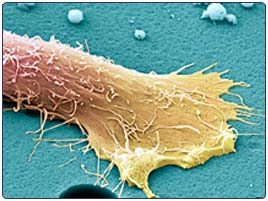Meat ‘Ups Prostate Cancer Risk’
By | Фев 14, 2009

Eating meat and dairy products may increase the risk of prostate cancer, research suggests.
Such a diet raises levels of a hormone called Insulin-like Growth Factor-1 (IGF-1) which promotes cell growth.
A University of Oxford team examined the results of 12 studies, featuring a total of nearly 9,000 men.
They found men with high blood levels of IGF-1 were up to 40% more likely to develop prostate cancer than those with low levels.
The study appears in the journal Annals of Internal Medicine.
IGF-1 plays a key role in the growth and development of children and adolescents.
In adults it continues to regulate cell growth and death, but it can also inhibit the death of cells which have come to the end of their natural life cycle.
Extent unclear
Lead researcher Dr Andrew Roddam said the degree to which diet influenced IGF-1 levels was unclear.
But he said levels could be up to 15% higher in people who ate a lot of meat and dairy products.
Dr Roddam said: “There is a need to identify risk factors for prostate cancer, especially those which can be targeted by therapy and/or lifestyle changes.
“Now we know this factor is associated with the disease we can start to examine how diet and lifestyle factors can affect its levels and whether changes could reduce a man’s risk.”
Dr Roddam said raised levels of IGF-1 were likely not only to increase the risk of developing prostate cancer, but also to aid the spread of tumours.
Research shows that cells fed IGF-1 grow much more quickly.
However, Dr Roddam said there was no evidence to suggest that measuring IGF-1 levels could be used to develop a new test to screen for prostate cancer.
Each year in the UK more than 34,000 men are diagnosed with prostate cancer and around 10,000 die of the disease.
Dr Lesley Walker, of the charity Cancer Research UK, which funded the study, said: “While there are established risk factors associated with prostate cancer of age, family history, and ethnicity, there are no clear data on modifiable risk factors.”
And Debbie Clayton, of the Prostate Cancer Charity, agreed such areas of research could be useful.
But she added: “More research is needed, however, before this can be translated into useful advice for men on which foods may need to be modified in their diet.”















